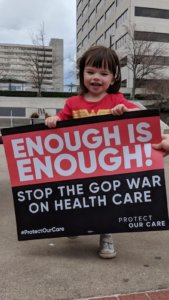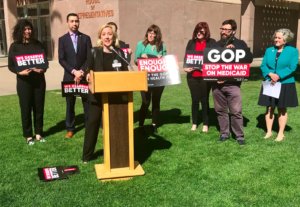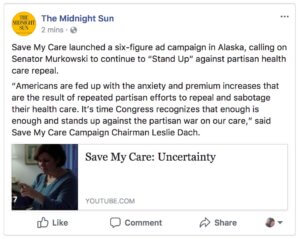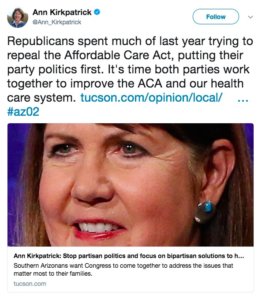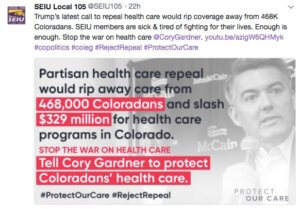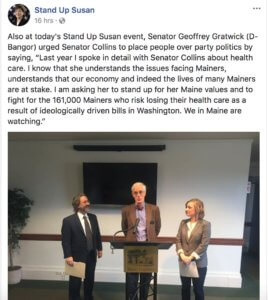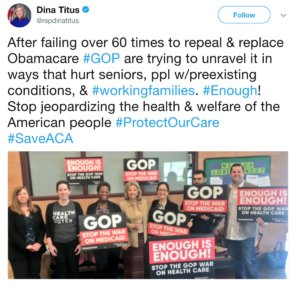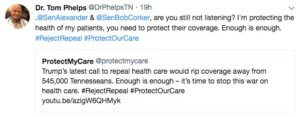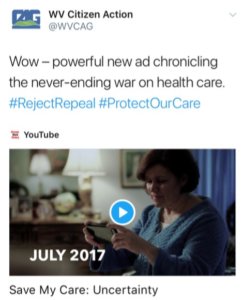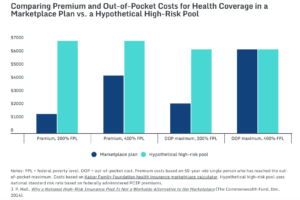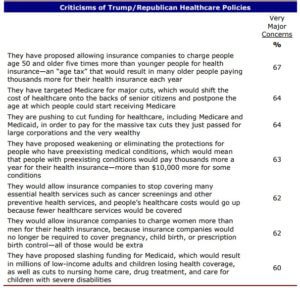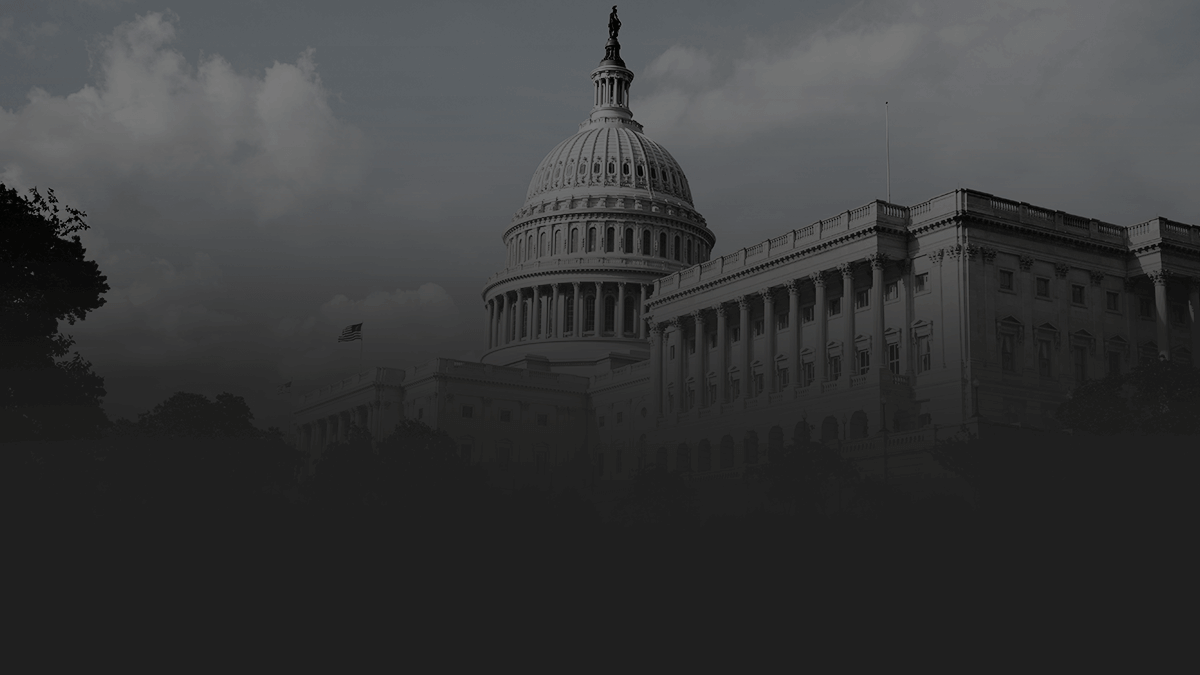Today, the Trump Administration announced a plan to let insurance companies sell short-term junk insurance year-round, ramping up its sabotage of the Affordable Care Act. These scam insurance plans don’t have to cover people with pre-existing conditions, re-impose lifetime caps, and don’t have to cover the essential medical benefits required by the Affordable Care Act, including maternity care and prescription drug benefits. Today’s proposal would weaken American health coverage, something nearly every major media outlet, health care expert, and stakeholder pointed out.
The coverage of President’s Trump’s latest effort to sabotage American health care is brutal. Take a look:
NBC News: “Trump Pushes Insurance That Doesn’t Cover Pre-Existing Conditions.” “The Trump administration announced Tuesday that it is moving to expand the use of low-budget temporary insurance, which could offer customers a cut-rate alternative to plans on the Affordable Care Act’s exchange, but undermine more comprehensive insurance for others… Unlike the ACA’s plans, they are not required to cover pre-existing conditions, cover specific treatments, or provide unlimited benefits. The plans are normally supposed to cover a brief lapse in coverage, but the order makes it easier to rely on them as primary insurance. Health experts say they’re likely to be cheaper, but they could raise premiums for patients who need comprehensive plans through Obamacare by siphoning away young and healthy customers into a separate market.” [NBC News, 2/20/18]
Washington Post: Short-Term Plans Next Part Of Trump Administration’s Plan To “Dismantle” Affordable Care Act. “The order is part of the administration’s strategy to circumvent parts of the sprawling 2010 health-care law — President Barack Obama’s primary domestic legacy — through executive actions. The moves are an alternate route given the Republican-led Congress’s inability last year to dismantle much of the law — although Trump is still urging lawmakers to try again, despite GOP Senate leaders’ reluctance.” [Washington Post, 2/20/18]
NPR: “Trump Administration Wants To Let Insurers Offer Plans With Fewer Benefits.” “The Trump administration wants to allow insurance companies to offer more policies that have limited health benefits and that can reject customers if they have pre-existing medical conditions.” [NPR, 2/20/18]
Kaiser Health News: Trump Administration Proposes Rule “That Can Reject People With Preexisting Medical Conditions.” “The new rule is expected to entice younger and healthier people from the general insurance pool by allowing a range of lower-cost options that don’t include all the benefits required by the federal law — including plans that can reject people with preexisting medical conditions.” [Kaiser Health News, 2/20/18]
Huffington Post: Plans Would Make “It More Difficult For People Who Need Or Want More Comprehensive Coverage To Get It.” “Taken together, the two steps ― getting rid of the mandate and then changing the rules on short-term plans ― could accelerate an evolution already underway for people buying insurance on their own, rather than through an employer… The new regulations would also render the law’s insurance reforms less effective, making it more difficult for people who need or want more comprehensive coverage to get it.” [Huffington Post, 2/20/18]
Reuters: “Another Trump Administration Move Aimed At Undercutting” The ACA. “The U.S. government on Tuesday proposed extending the availability of skimpy health insurance plans to millions of Americans in another Trump administration move aimed at undercutting the requirements of the Affordable Care Act, often called Obamacare…The plans will not include the benefits that define the insurance created under Democratic former President Barack Obama, including required health benefits such as maternity coverage and the guarantee of insurance regardless of health.” [Reuters, 2/20/18]
Wall Street Journal: Plans “Allow Insurers [To] Charge Higher Premiums Based On A Consumer’s Health Status.” “The plans are often sold only to people who qualify as healthy and they may have annual limits on the amount of care they will cover. The plans don’t have to cover people with pre-existing conditions, for example, and insurers can charge higher premiums based on a consumer’s health status. They also don’t have to include benefits mandated by ACA plans such as prescription-drug coverage… Health analysts say the more extensive short-term plans that would be allowed under the latest proposal could appeal to healthier customers seeking less-expensive alternatives to ACA plans. Higher-risk people would be likely to remain in traditional insurance coverage, however. That would cause their premiums to rise because healthier consumers are needed on the ACA’s exchanges to offset the costs of older and sicker people.” [Wall Street Journal, 2/20/18]
New York Times: Plans “Offer Significantly Less Protection To Consumers.” “Short-term policies are intended for people who are between jobs or need temporary coverage for other reasons. They are generally cheaper than insurance that meets the law’s requirements, but they offer significantly less protection to consumers. Insurers often deny short-term policies to people with pre-existing conditions and can charge higher premiums because of such conditions. Short-term policies do not have to provide the ‘essential health benefits’ that are required by the Affordable Care Act. They may, for example, omit coverage of maternity care, mental health care or addiction treatment. Short-term policies may impose limits on the amount the insurer will pay, but they do not have to cap the patient’s out-of-pocket costs.” [New York Times, 2/20/18]
USA Today: “Trump Proposes 12-month Insurance Plans That Don’t Cover People, Issues Obamacare Requires.” “The Trump administration proposed Tuesday that people be allowed to buy short-term insurance plans that don’t cover the benefits — or people — required to be covered by the Affordable Care Act (ACA)… The ACA was designed to prevent some of the situations the new plans would create, critics said. They could deny coverage based on pre-existing conditions, generally cover few benefits and can cap the benefits provided. The plans could also pull more healthy people out of the pool of people signing up for the ACA, and that could lead to higher premiums for those who remain and aren’t eligible for subsidies.” [USA Today, 2/20/18]
Bloomberg: “Trump Proposes Bigger Role for Skimpy Insurance, Undermining Obamacare.” “The Trump administration is proposing to expand the availability of short-term insurance plans, offering a cheaper health coverage option for consumers, while taking another step to undercut Obamacare… Combined with earlier moves by the Trump administration — such as ending the ACA requirement that all people buy health coverage or pay a fine — the latest proposals could result in higher costs or fewer options for individuals who still want to buy the more comprehensive Obamacare plans.” [Bloomberg, 2/20/18]
Politico: Trump Administration Pushing Plans “That Some Deride As ‘Junk Insurance.’” “The Trump administration is proposing to expand the availability of short-term health insurance plans that some deride as ‘junk insurance’ — an effort that could give consumers cheaper coverage options but undermine Obamacare’s marketplaces and popular protections for pre-existing medical conditions… Many health care experts fear expanding the availability of the health plans, which are exempt from Obamacare’s robust consumer protections, could further destabilize the law’s wobbly insurance markets. Critics say the plans offer just the illusion of coverage, and enrollees often don’t realize how limited their benefits are until it’s too late. Short-term plans maintain cheaper prices than traditional insurance by refusing coverage for pre-existing conditions, in some cases, and some medical services. Unlike Obamacare coverage, the short-term plans typically cap payouts, which could leave enrollees with catastrophic illnesses or injuries on the hook for huge medical bills.” [Politico, 2/20/18]
Talking Points Memo: Proposed Plans Represent “Further Gutting O’Care Market.” “Many health care experts and economists say the sale of these skimpy “junk insurance” plans will draw younger and healthier people out of Obamacare’s individual market, making the remaining risk pool older, sicker, less stable, and more expensive.” [Talking Points Memo, 2/20/18]
Vox: “Experts Anticipate [These] Changes Would Damage The Market.” By broadening the definition of short-term insurance, the Trump administration is opening more loopholes for more people to buy insurance outside the health care law’s marketplaces. In the eyes of the administration, this is fulfilling a campaign promise that President Trump made to give people relief from Obamacare… But experts anticipate those changes would damage the market for customers who are left behind. Because younger and healthier people are more likely to leave the markets and buy short-term insurance, leaving an older and sicker pool behind, the ACA markets are likely to face higher premiums. And some insurers might decide to leave the law’s markets altogether if the customers become too unhealthy and therefore too expensive.” [Vox, 2/20/18]
ThinkProgress: Trump Administration’s Latest Attack On Obamacare Would Cost Taxpayers Millions. “The administration is proposing to expand access to short-term health plans, which is intended to fill temporary gaps in coverage and provide some consumers with cheaper options because the plan’s coverage is limited. This is just the latest move to undermine the ACA, and it’ll cost the federal government anywhere between $96 to $168 million more every year.” [ThinkProgress, 2/20/18]
Stephanie Armour, Wall Street Journal: Short-Term Plans Will Mean Higher Premiums. “If the estimated 200,000 people leave exchanges for short term plans, average est. monthly premium goes from $649 to $718 on exchanges based on proposed rule.” [Twitter, 2/20/18]
Catherine Rampell, Washington Post: Short Term-Plans A “Recipe For Siphoning Off Health People And Unraveling The Individual Market.” [Twitter, 2/20/18]
Jonathan Cohn, Huffington Post: “And Now, Another Effort To Undermine Aca Regulations.” [Twitter, 2/20/18]
Ana Marie Cox: “Another Awesome Thing To Be Doing In the Middle Of An Addiction Epidemic.” [Twitter, 2/20/18]
Norm Ornstein, American Enterprise Institute: “Disgraceful.” “Alex Azar at HHS now doing his part to sabotage Obamacare and cost taxpayers hundreds of millions, while taking healthy people out of risk pools and increasing premiums for others. Disgraceful.” [Twitter, 2/20/18]
Health care experts ripped the announcement, and previewed the extensive problems it would cause:
Mike Kreidler, Washington State Insurance Commissioner: “If You Get Sick You May Not Be Able To Renew Your Coverage — There Are No Protections For People With Pre-existing Conditions. Maternity Care And Mental-Health Benefits Often Are Excluded.” [New York Times, 2/20/18]
Larry Levitt, Kaiser Family Foundation Senior Vice President: “Short-Term Insurance Plans Don’t Cover Pre-Existing Conditions, Don’t Cover The ACA’s Essential Benefits, And Can Impose Annual Limits On Coverage.” “Short-term insurance plans don’t cover pre-existing conditions, don’t cover the ACA’s essential benefits, and can impose annual limits on coverage. The expansion of short-term health insurance plans is part of a strategy to create a parallel insurance market that does not comply with the ACA’s rules. Short-term insurance plans will cherry pick healthy people, leaving ACA-compliant plans to cover a sicker pool with higher premiums. With the expansion in short-term insurance plans, low-income people will be protected from higher premiums by subsidies. Middle-class people with pre-existing conditions will feel the full brunt of higher premiums.” [Twitter, 2/20/18]
Rachel Sachs, Health Law Professor: “The Government Will Spend Millions More To Provide Fewer People With Comprehensive Coverage.” “HHS projects this change will cost the government $96-$168 million more every year. So the government will spend millions more to provide fewer people with comprehensive insurance.” [Twitter, 2/20/18]
Loren Adler, Director of USC-Brookings Schaeffer Initiative for Health Policy: “For Middle Class & Above, This Moves Individual Market Away From Providing Insurance, ↓ Costs For The Healthy, ↑ Them For The Sick. This Is A VERY Expensive Rule For Taxpayers.” [Twitter, 2/20/18]
Robert Laszewski, Health Industry Consultant: Plans Will “Woe Unto Those Who Get A Condition And Have To Go Back Into Obamacare.” “If consumers think Obamacare premiums are high today, wait until people flood into these short-term and association health plans…The Trump administration will bring rates down substantially for healthy people, but woe unto those who get a condition and have to go back into Obamacare.” [Kaiser Health News, 2/20/18]
Robert Laszewski, Health Industry Consultant: “We’re Going To Have Two Different Markets, A Wild West Frontier Called Short-Term Medical…And A High-Risk Pool Called Obamacare.” [Kaiser Health News, 2/20/18]
Kevin Lucia, Georgetown University Health Policy Institute Project Director: “It Will Undermine The Individual Market Risk Pool.” [Kaiser Health News, 2/20/18]
Sarah Lueck, Center On Budget And Policy Priorities Health Policy Expert: Plans Mean “Making People With Pre-Existing Conditions Pay Premiums That Reflect Their Health Status.” “Something I learned from the proposed rule on short-term plans: ‘Actuarially fair’ apparently means, in this Administration, making people with pre-existing conditions pay premiums that reflect their health status.” [Twitter, 2/20/18]
Dania Palanker, Former National Women’s Law Center Senior Counsel For Health And Reproductive Rights: “Mental Health Crisis? Short-Term Plans Exclude Mental Health. Opioid Crisis? Short-Term Plans Exclude Substance Use Treatment. Maternal Mortality Crisis? Short-Term Plans Exclude Maternity Coverage.” [Twitter, 2/20/18]
Center On Budget And Policy Priorities: Short-Term Health Plans Would Raise Premiums In Individual Market, Undermine Market Reforms, And Expose More Consumers To Gaps And High Costs. “This would let a parallel market for skimpy plans operate alongside the market for comprehensive individual health insurance, exposing consumers to new risks and raising premiums for people seeking comprehensive coverage, especially middle-income consumers with pre-existing conditions.” [Center on Budget and Policy Priorities, 2/20/18]
The announcement was also criticized by stakeholders, who know first-hand what such a proposal will mean for Americans’ health:
American Cancer Society Cancer Action Network, American Heart Association, American Liver Foundation, American Lung Association, Arthritis Foundation, Consumers Union, Crohn’s & Colitis Foundation, Cystic Fibrosis Foundation, Epilepsy Foundation, Leukemia And Lymphoma Society, Lutheran Services In America, March Of Dimes, National Health Council, National Ms Society, National Organization For Rare Disorders, United Way, World Wide Volunteers Of America: “The Proposed Rule Released Today Would Permit Insurance Companies To Offer Substandard Insurance Policies To Millions Of Americans… As Organizations Committed To Ensuring That Coverage Remains Affordable, Accessible, And Adequate For All Americans, We Cannot Support This Proposal. “The proposed rule released today would permit insurance companies to offer substandard insurance policies to millions of Americans. As drafted, the rule could result in the proliferation of lower-premium plans, known as ‘short-term limited duration’ plans that could exclude coverage for critically important health care services, charge individuals with pre-existing health conditions higher rates, increase deductibles, and place strict limits on benefits. These lower-premium plans are designed to draw younger and healthier individuals away from the individual marketplace – leaving them with inadequate coverage if they become ill or injured. Older and less healthy individuals that remain in more comprehensive plans will likely see their insurance premiums increase dramatically, making it even more challenging to secure the care they need and deserve. It will also create confusion for the American public about which types of plans will cover the services they need – creating an opportunity for consumers to purchase plans that would leave them unknowingly underinsured. As organizations committed to ensuring that coverage remains affordable, accessible, and adequate for all Americans, we cannot support this proposal.” [Consumers Union, 2/20/18]
America’s Health Insurance Plans: “We Remain Concerned The Expanded Use Of Short-Term Plans Could Further Fragment The Individual Market, Which Would Lead To Higher Premiums For Many Consumers, Particularly Those With Pre-Existing Conditions.”While we are reviewing the proposed rule to understand its impact on the people we serve, we remain concerned that expanded use of short-term policies could further fragment the individual market, which would lead to higher premiums for many consumers, particularly those with pre-existing conditions.” [Twitter, 2/20/18]
American Cancer Society-Cancer Action Network: Plans Represent A Roll Back of Critical Patient Protections. “Short-term plans can deny coverage based on pre-existing conditions, often cover very few benefits and can set caps on what limited benefits are provided. While these exemptions make these policies inexpensive, they also create plans with potentially inadequate coverage. Short-term plans are meant to be a bridge, not a substitute, for long-term meaningful coverage. Permitting plans to be renewed indefinitely would likely result in more people struggling with unexpected health care bills and insufficient insurance.” [ACS-CAN, 2/20/18]
Community Catalyst: Short-Term Plans Proposed by Trump Administration Would Roll Back Consumer Protections Enshrined in Affordable Care Act. “By giving insurance companies more leeway to sell plans that can skirt protections the ACA put in place specifically to ensure people with preexisting conditions such as cancer, asthma or diabetes wouldn’t be denied or priced out of coverage, President Trump is once again prioritizing politics over peoples’ health.” [Community Catalyst, 2/20/18]
Wisconsin Cancer Council: “Bottom Line: These Plans Do Not Have Protections Guaranteed.” “Bottom line: these plans do not have protections like guaranteed issue and bans on coverage limits, and may contribute to rising premiums for full coverage #ACA plans in the individual market, especially after the tax penalty goes away in 2019.” [Twitter, 2/20/18]
Today’s announcement represents the Administration’s latest salvo in their war on health care, and yet again it is the American people who will be the victims. These junk insurance plans would be another way for the Trump Administration and insurance companies to dismantle the Affordable Care Act and the benefits that millions of Americans have come to rely on. Enough is enough – it’s time for the Trump Administration to end its war on our health care.
